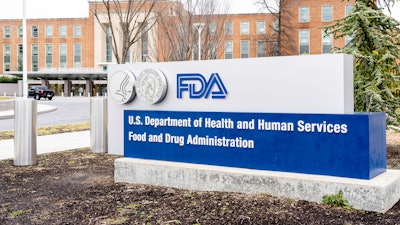
Food and beverage companies across the supply chain must be prepared for new developments on the regulatory front in 2022 as they seek to bring new ingredients and products to market. This article explores some of the top issues and trends companies should watch out for heading into 2022.
Expected Changes to the FDA’s Definition of “Healthy”
Product development is driven by a number of factors – one we are watching for in 2022 is the impact an expected change to the U.S. Food and Drug Administration’s (FDA) definition of “healthy” may have on new product development or reformulation. “Healthy” is an implied nutrient content claim that is defined in FDA regulations in reference to specific levels of total fat, saturated fat, cholesterol and sodium. The FDA has indicated that it will issue a proposed rule to revise the definition of “healthy” in the foreseeable future, and the agency has begun the process to develop a symbol that industry can use for products that meet the updated definition. Stakeholders should monitor for a proposed rule in 2022 that may update the existing definition by modifying limitations for certain nutrients, including saturated fat, sodium and added sugar.
Updated FDA Standards of Identity
Acknowledging that many standards of identity for food products are decades old, in February 2020, the FDA reopened a comment period for a prior proposed rule that would set general principles to consider in establishing, revisiting or revoking a standard of identity. The FDA has already indicated it plans to modernize several standards as it looks toward 2022 priorities.
Labeling Clarity on Animal Cell Technology
While many manufacturers are racing to get products produced via cells harvested from meat, poultry and seafood to market, the FDA and the U.S. Department of Agriculture (USDA) – with their joint oversight over the development and marketing of these products – have yet to resolve labeling issues. In October 2020, the FDA issued a request for information about the names or statements of identity for foods made with cultured seafood cells, and the USDA followed with the recent publication of an advance notice of proposed rulemaking on the labeling of meat and poultry products composed of or containing cultured cells derived from animals subject to its authorities. Clarity and potential alignment from the agencies on this issue in 2022 is expected but remains to be seen.
A Focus on Heavy Metals in Baby Food and Other Substances of Interest
Following a congressional report on the levels of heavy metals in baby food, manufacturers in this space saw a flurry of activity in 2021 – from the FDA’s “Closer to Zero” action plan to the introduction of the Baby Food Safety Act to consumer class action lawsuits. The FDA has indicated it will propose action levels for lead in baby food by April 2022 (and action levels for other heavy metal contaminants in the years that follow), but other stakeholders – including NGOs, Congress and state attorneys general – are likely to continue to push the agency to expedite its timelines. In addition to heavy metals in baby foods, we expect continued attention placed on other substances of interest present in food or food packaging materials, including PFAS, acrylamide and BPA. Stakeholders in the food and beverage industry should monitor for developments out of regulatory agencies, state enforcement actions and consumer class action challenges.
Regulation of Cannabinoids
Though it has long permitted the sale and use of marijuana for medical (legalized in 1996) and recreational (legalized in 2016) use, in 2021 California opened up new regulatory pathways, separate from the regulation of marijuana, to include CBD or other cannabinoids in food products. Though similar to the regulation of CBD and other cannabinoids in many other states, California’s action is in direct conflict with the FDA’s position that because it was used in a publicized clinical trial and is the active ingredient of a marketed drug, CBD may not be utilized as an ingredient in food unless the FDA promulgates a regulation permitting such use. Nevertheless, the FDA continues to take a hands-off enforcement approach regarding CBD marketed as an ingredient in food or dietary supplements unless health claims are made. Conversely, delta-8-THC, a psychoactive cannabinoid not expressly banned by the FDA for use in food or dietary supplements, has come under FDA scrutiny as potentially harmful.
There also continues to be legislation introduced in Congress to further legalize cannabis, products derived from cannabis, and activity related to such products.
We expect that in 2022 we will see a continued acceptance of marijuana and cannabinoids by states, leading to additional pressure to open the market to CBD in food and dietary supplements (among other loosening of restrictions) on a federal level. We may further see active enforcement against cannabinoids, like delta-8-THC, deemed by the FDA or state regulators to present an unreasonable risk of harm in the absence of governmental oversight. Companies marketing cannabinoids should continue to be aware of both the federal ban on the use of CBD in food or dietary ingredients and the rapidly evolving legal landscape (including the possibility of statutory or regulatory modification to the CBD ban and enforcement against specific cannabinoid ingredients).
COVID-19 Implications
Supply Chain Backlog
We continue to see severe backlogs at several major ports, resulting in an inability for importers to meet demand for ingredients, packaging and finished food and dietary supplement products. The backlog and increased transportation costs have and may continue to result in increased prices of raw materials, ingredients, and food packaging and delays in domestic manufacturing output. These challenges have also necessitated modifications to formulation of some products. Depending on continued supply issues, the FDA may continue to provide flexibility into 2022 in labeling food products to accommodate minor modifications. Companies may wish to seek alternative sources for ingredients and packaging materials – in some cases this may require identifying alternative ingredients that may be substitutable under the FDA’s policies until supply chains are reliably unstuck.
Impact of Continued COVID-19 Outbreaks
Current and future increased COVID-19 rates due to new mutations of SARS-CoV-2 or low regional vaccination rates will have the dual impact of continued relaxation of certain FDA requirements and increased shortages and supply chain bottlenecks.
Though the FDA still requires hazard assessments as part of manufacturers’ food safety plans, it has relaxed requirements for on-site audits required by the assessment if travel to a facility would be unsafe due to COVID-19 risks and alternative verification methods are utilized. We believe the FDA is likely to continue this policy for the foreseeable future, and companies should develop plans to verify the safety of ingredients they purchase without on-site audits.
One source of supply shortages has been reduced employee availability due to illness or efforts to prevent employee illnesses. These same issues have been one cause of shipping delays as labor shortages at ports result in slowdowns in unloading ships and moving cargo out of ports. This issue highlights the need for individuals and companies to take steps to reduce risks of employee illness to ensure continued employee availability.
The Final Word
 Jockel
Jockel
 Wolf
Wolf
Benjamin Wolf is a senior associate in Alston & Bird’s Health Care Group and a member of the Food, Drug & Device/FDA Team counseling clients in many industries regulated by the Food and Drug Administration (FDA). Ben advises clients in the food, beverage, dietary supplement, CBD and cannabis, tobacco, medical device, pharmaceutical, and biologics spaces.






















